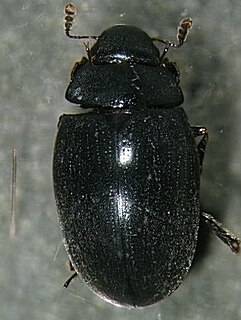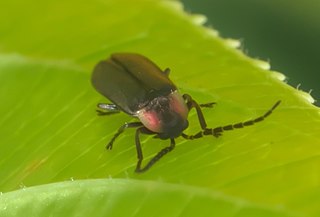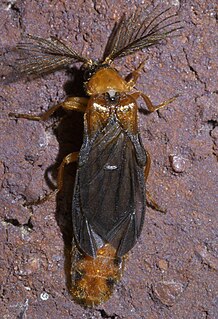
The Lampyrini are a tribe of fireflies in the large subfamily Lampyrinae. The lineage formerly separated as Pleotomini seems to be a specialized offshoot of the Lampyrini not too distant from the type genus Lampyris and is therefore included here. This tribe occurs throughout the Holarctic and contains the typical "glowing" or "continuous-light" fireflies from that region. Some otherwise very advanced Lampyrini, like species in Paraphausis and Pyrocoelia, have degenerated light-producing organs again and communicate primarily or even exclusively with pheromones like the ancestors of the fireflies did.

Nosodendridae is a family of beetles, with only 67 species in three genera:
Atyphella is a genus of 'flashing' firefly found in the Australasian region, particularly in the eastern and northern regions of Australia. The genus consists of 23 recognized species, 14 considered to be endemic to Australia.

Pterostichinae is a subfamily of ground beetles. It belongs to the advanced harpaline assemblage, and if these are circumscribed sensu lato as a single subfamily, Pterostichinae are downranked to a tribe Pterostichini. However, as the former Pterostichitae supertribe of the Harpalinae as loosely circumscribed does seem to constitute a lineage rather distinct from Harpalus, its core group is here considered to be the present subfamily and the Harpalinae are defined more narrowly.

Epicauta is a genus of beetles in the blister beetle family, Meloidae. The genus was first scientifically described in 1834 by Pierre François Marie Auguste Dejean. Epicauta is distributed nearly worldwide, with species native to all continents except Australia. Surveys have found the genus to be particularly diverse in northern Arizona in the United States. Few species occur in the Arctic, with none farther north than the southern Northwest Territory of Canada.

Pyractomena is a genus of fireflies in the family Lampyridae. There are at least 20 described species in Pyractomena.

Pleotomus is a genus of fireflies in the family Lampyridae. There are about five described species in Pleotomus.

Aspisoma is a genus of fireflies in the family Lampyridae. There are at least 70 described species in Aspisoma.

Pyropyga is a genus of fireflies in the beetle family Lampyridae. There are about 13 described species in Pyropyga.

Nosodendron is a genus of wounded-tree beetles in the family Nosodendridae. There are more than 70 described species in Nosodendron.

Phengodes is a genus of glowworms in the beetle family Phengodidae. There are more than 30 described species in Phengodes.
Prolutacea is a genus of fireflies in the family of beetles known as Lampyridae, containing a single described species, Prolutacea pulsator.
Nelsonphotus is a genus of fireflies in the family of beetles known as Lampyridae, containing a single described species, Nelsonphotus aridus.
Pleotomus pallens is a species of firefly in the beetle family Lampyridae. It is found in Central America and North America. The female firefly of this species emits a brighter form of light than the male and this light decreases after she lays eggs; after she has performed this duty, she dies.
Tenaspis is a genus of fireflies in the beetle family Lampyridae. There are about 18 described species in Tenaspis.
Pyropyga minuta is a species of firefly in the beetle family Lampyridae. It is found in Central America, North America, and South America.
Bicellonycha wickershamorum is a species of firefly in the beetle family Lampyridae. It is found in North America.









